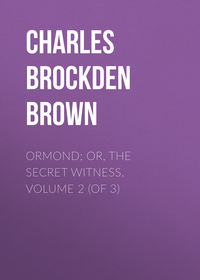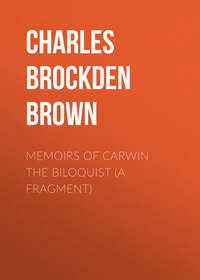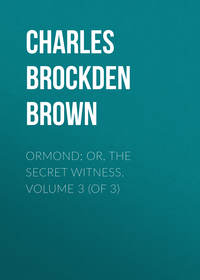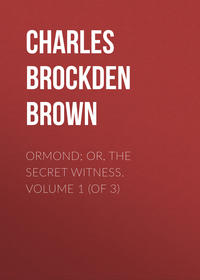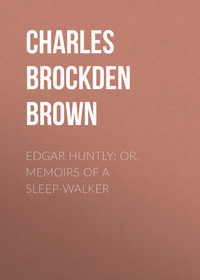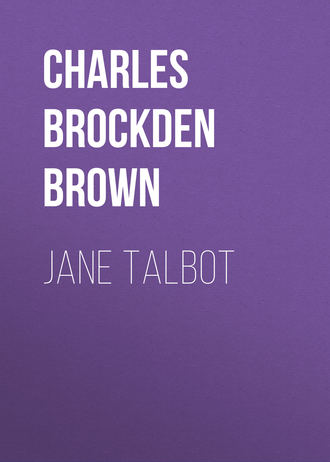 полная версия
полная версияJane Talbot
You say I can. The image of myself in my own mind is a sorry compound of hateful or despicable qualities. I am even out of humour with my person, my face. So absurd am I in my estimates of merit, that my homely features and my scanty form had their part in restraining me from aspiring to one supreme in loveliness, and in causing the surprise that followed the discovery of your passion.
In your eyes, however, this mind and this person are venerable and attractive. My affection, my company, are chief goods with you. The possession of all other goods cannot save you from misery, if this be wanting. The loss of all others will not bereave you of happiness if this be possessed.
Fain would I believe you. You decide but reasonably. Fortune's goods ought not to be so highly prized as the reason of many prizes them, and as my habits, in spite of reason's dissent and remonstrances, compel me to prize them. They contribute less to your happiness, and that industry and frugality which supplies their place, you look upon without disgust; with even some degree of satisfaction.
Not so I: I cannot labour for bread; I cannot work to live. In that respect I have no parallel. The world does not contain my likeness. My very nature unfits me for any profitable business. My dependence must ever be on others or on fortune.
As to the influence of some stronger motive to industry than has yet occurred, I am without hope. There can be no stronger ones to a generous mind, than have long been urgent with me: being proof against these, none will ever conquer my reluctance.
I am not indolent, but my activity is vague, profitless, capricious. No lucrative or noble purpose impels me. I aim at nothing but selfish gratification. I have no relish, indeed, for sensual indulgences. It is the intellectual taste that calls for such banquets as imagination and science can furnish; but, though less sordid than the epicure, the voluptuary, or the sportsman, the principle that governs them and me is the same; equally limited to self; equally void of any basis in morals or religion.
Should you give yourself to me, and rely upon my labour for shelter and food, deplorable and complete would be your disappointment. I know myself too well to trust myself with such an office. My love for you would not strengthen my heart or my hands. No; it would only sink me with more speed into despair. Quickly, and by some fatal deed, should I abandon you, my children and the world.
Possibly I err. Possibly I underrate my strength of mind and the influence of habit, which makes easy to us every path; but I will not trust to the possible.
Hence it is that, if by marriage you should become wholly dependent on me, it could never take place. Some freak of fortune may indeed place me above want, but my own efforts never will. Indeed, in this forbearance, in this self-denial, there is no merit. While admitted to the privileges of a betrothed man, your company, your confidence, every warrantable proof of love mine, I may surely dispense with the privileges of wedlock. Secretly repine I might; occasionally I might murmur. But my days would glide along with fewer obstacles, at least, than if I were that infirm and disconsolate wretch, your husband.
But this unhappy alternative is not ours. Thou hast something which thy mother cannot take away; sufficient for thy maintenance, thy frugal support. Meaner and more limited indeed than thy present and former affluence; such as I, of my own motion, would never reduce thee to; such as I can object to only on thy own account.
How has the night run away! My friend's sister arrived here yesterday. They joined in beseeching me to go to a separate chamber and strive for some refreshment. I have slept a couple of hours, and that has sufficed. My mind, on waking, was thronged with so many images connected with my Jane, that I started up at last and betook myself to the pen.
Yet how versatile and fleeting is thought! In this long letter I have not put down one thing that I intended. I meant not to repeat what has been so often said before, and especially I meant not to revolve, if I could help it, any gloomy ideas.
Thy letters gave me exquisite pleasure. They displayed all thy charming self to my view. I pressed every precious line to my lips with nearly as much rapture as I would have done the prattler herself, had she been talking to me all this tenderness instead of writing it.
I took up the pen that I might tell thee my thanks, yet rambled almost instantly into mournful repetitions. I have half a mind to burn the scribble, but I cannot write more just now, and this will show you, at least, that I am not unmindful of you. Adieu.
COLDEN.
Letter XXVIII
To Mrs. TalbotBaltimore, November 6.
Let me see! this is the beginning of November. Yes; it was just a twelvemonth ago that I was sitting, at this silent hour, at a country-fire just like this. My elbow then as now was leaning on a table, supplied with books and writing-tools.
"What shall I do," thought I, "then, to pass away the time till ten? Can't think of going to bed till that hour, and if I sit here, idly basking in the beams of this cheerful blaze, I shall fall into a listless, uneasy doze, that, without refreshing me, as sleep would do, will unfit me for sleep.
"Shall I read? Nothing here that is new. Enough that is of value, if I could but make myself inquisitive; treasures which, in a curious mood, I would eagerly rifle; but now the tedious page only adds new weight to my eyelids.
"Shall I write? What? to whom? there are Sam and Tom, and brother Dick, and sister Sue: they all have epistolary claims upon me still unsatisfied. Twenty letters that I ought to answer. Come, let me briskly set about the task–
"Not now; some other time. To-morrow. What can I write about? Haven't two ideas that hang together intelligibly. 'Twill be commonplace trite stuff. Besides, writing always plants a thorn in my breast.
"Let me try my hand at a reverie; a meditation,–on that hearth-brush. Hair–what sort of hair? of a hog; and the wooden handle–of poplar or cedar or white oak. At one time a troop of swine munching mast in a grove of oaks, transformed by those magicians, carpenters and butchers, into hearth-brushes. A whimsical metamorphosis, upon my faith!
"Pish! what stupid musing! I see I must betake myself to bed at last, and throw away upon oblivion one more hour than is common."
So it once was. But how is it now? no wavering and deliberating what I shall do,–to lash the drowsy moments into speed. In my haste to set the table and its gear in order for scribble, I overturn the inkhorn, spill the ink, and stain the floor.
The damage is easily repaired, and I sit down, with unspeakable alacrity, to a business that tires my muscles, sets a gnawer at work upon my lungs, fatigues my brain, and leaves me listless and spiritless.
How you have made yourself so absolute a mistress of the goose-quill, I can't imagine; how you can maintain the writing posture and pursue the writing movement for ten hours together, without benumbed brain or aching fingers, is beyond my comprehension.
But you see what zeal will do for me. It has enabled me to keep drowsiness, fatigue, and languor at bay during a long night. Converse with thee, heavenly maid, is an antidote even to sleep, the most general and inveterate of all maladies.
By-and-by I shall have as voluble a pen as thy own. And yet to that, my crazy constitution says, Nay. 'Twill never be to me other than an irksome, ache-producing implement. It need give pleasure to others, not a little, to compensate for the pain it gives myself.
But this, thou'lt say, is beside the purpose. It is; and I will lay aside the quill a moment to consider. I left off my last letter, with a head full of affecting images, which I have waited impatiently for the present opportunity of putting upon paper. Adieu, then, for a moment, says thy
COLDEN.
Letter XXIX
To the Same10 o'clock at night.
Now let us take a view of what is to come. Too often I endeavour to escape from foresight when it presents to me nothing but evils, but now I must, for thy sake, be less a coward.
In six weeks Jane becomes mine. Till then, thy mother will not cast thee out of her protection. And will she then? will she not allow of thy continuance in thy present dwelling? and, though so much displeased as to refuse thee her countenance and correspondence, will she indeed turn thee out of doors? She threatens it, we see; but I suspect it will never be more than a threat, employed, perhaps, only to intimidate and deter; not designed to be enforced. Or, if made in earnest, yet, when the irrevocable deed is done, will she not hesitate to inflict the penalty? Will not her ancient affection; thy humility, thy sorrow, thy merits,–such as, in spite of this instance of contumacy, she cannot deny thee,–will not these effectually plead for thee?
More than ever will she see that thou needest her bounty; and, since she cannot recall what is past, will she not relent and be willing to lessen the irremediable evil all she can?
There is one difficulty that I know not how to surmount. Giving to the wife will be only giving to the husband. Shall one whom she so much abhors be luxuriously supplied from her bounty?
The wedded pair must live together, she will think; and shall this hated encroacher find refuge from beggary and vileness under her roof,–be lodged and banqueted at her expense? That her indignant heart will never suffer.
Would to Heaven she would think of me with less abhorrence! I wish for treatment conformable to her assumed relation to thee, for all our sakes. As to me, I have no pride; no punctilio, that will stand in the way of reconciliation. At least there is no deliberate and steadfast sentiment of that kind. When I reason the matter with myself, I perceive a sort of claim to arise from my poverty and relation to thee on the one hand, and, on the other, from thy merit, thy affinity to her, and her capacity to benefit. Yet I will never supplicate–not meanly supplicate–for an alms. I will not live, nor must thou, when thou art mine, in her house. Whatever she will give thee, money, or furniture, or clothes, receive it promptly and with gratitude; but let thy home be thy own. For lodging and food be thou the payer.
And where shall be thy home? You love the comforts, the ease, the independence of a household. Your own pittance will not suffice for this. All these you must relinquish for my sake. You must go into a family of strangers. You must hire a chamber, and a plate of such food as is going. You must learn to bear the humours and accommodate yourself to the habits of your inmates.
Some frugal family and humble dwelling must content thee. A low roof, a narrow chamber, and an obscure avenue, the reverse of all the specious, glossy, and abundant that surround thee now, will be thy portion,–all that thou must look for as my wife. And how will this do, Jane? Is not the price too great?
And my company will not solace thee under these inconveniences. I must not live with thee; only an occasional visitor; one among a half-dozen at a common fire; with witnesses of all we say. Thy pittance will do no more than support thyself. I must house myself and feed elsewhere. Where, I know not. That will depend upon the species of employment I shall be obliged to pursue for my subsistence. Scanty and irksome it will be, at best.
Once a day I may see thee. Most of my evenings may possibly be devoted to thy company. A soul harassed by unwelcome toil, eyes dim with straining at tiresome or painful objects, shall I bring to thee. If now and then we are alone, how can I contribute to thy entertainment? The day's task will furnish me with nothing new. Instead of alleviating, by my cheerful talk, thy vexations and discomforts, I shall demand consolation from thee.
And yet imperious necessity may bereave us even of that joy. I may be obliged to encounter the perils of the seas once more. Three-fourths of the year, the ocean may divide us, thou in solitude, the while, pondering on the dangers to which I may be exposed, and I, a prey to discontent, and tempted in some evil hour to forget thee, myself, and the world.
How my heart sinks at this prospect! Does not thine, Jane? Dost thou not fear to take such a wretched chance with me? I that know myself, my own imbecility,–I ought surely to rescue thee from such a fate, by giving thee up.
I can write no more just now. I wonder how I fell into this doleful strain. It was silly in me to indulge it. These images are not my customary inmates. Yet, now that they occur to me, they seem but rational and just. I want, methinks, to know how they appear to thee.
Adieu.
HENRY COLDEN.
Letter XXX
To the sameWilmington, November 7.
I have purposely avoided dwelling on the incidents that are passing here. They engross my thoughts at all times but those devoted to the pen, and to write to thee is one expedient for loosening their hold.
An expedient not always successful. My mind wanders, in spite of me, from my own concerns and from thine, to the sick-bed of my friend. A reverie, painful and confused, invades me now and then; my pen stops, and I am obliged to exert myself anew to shake off the spell.
Till now, I knew not how much I loved this young man. Strange beings we are! Separated as we have been for many a year, estranged as much by difference of sentiments as local distance, his image visiting my memory not once a month, and then a transitory, momentary visit; had he died a year ago, and I not known it, the stream of my thoughts would not have been ruffled by a single impediment. Yet, now that I stand over him and witness his decay–
Many affecting conversations we have had. I cannot repeat them now. After he is gone, I will put them all upon paper and muse upon them often.
His closing hour is serene. His piety now stands him in some stead. In calling me hither, he tells me that he designed not his own gratification, but my good. He wished to urge upon me the truths of religion, at a time when his own conduct might visibly attest their value. By their influence in making that gloomy path which leads to the grave joyous and lightsome, he wishes me to judge of their excellence.
His pains are incessant and sharp. He can seldom articulate without an effort that increases his pangs; yet he talks much in cogent terms, and with accurate conceptions, and, in all he says, evinces a pathetic earnestness for my conviction.
I listen to him with a heart as unbiassed as I can prevail on it to be; as free, I mean, from its customary bias; for I strive to call up feelings and ideas similar to his. I know how pure to him would be the satisfaction of leaving the world with the belief of a thorough change in me.
I argue not with him. I say nothing but to persuade him that I am far from being that contumacious enemy to his faith which he is prone to imagine me to be.
Thy mother's letter has called up more vividly than usual our ancient correspondence, and the effects of that disclosure. Yet I have not mentioned the subject to him. I never mentioned it. I could not trust myself to mention it. There was no need. The letters were written by me. I did not charge him to secrecy, and, if I had, he would not have been bound to compliance. It was his duty to make that use of them which tended to prevent mischief,–which appeared to him to have that tendency; and this he has done. His design, I have no doubt, was benevolent and just.
He saw not all the consequences that have followed, 'tis true; but that ignorance would justify him, even if these consequences were unpleasing to him; but they would not have displeased, had they been foreseen. They would only have made his efforts more vigorous, his disclosures more explicit.
His conduct, indeed, on that occasion, as far as we know it, seems irregular and injudicious. To lay before a stranger private letters from his friend, in which opinions were avowed and defended that he knew would render the writer detestable to her that read.
He imagined himself justified in imputing to me atrocious and infamous errors. He was grieved for my debasement, and endeavoured, by his utmost zeal and eloquence, to rectify these errors. This was generous and just: but needed he to proclaim these errors and blazon this infamy?
Yet ought I to wish to pass upon the world for other than I am? Can I value that respect which is founded in ignorance? Can I be satisfied with caresses from those who, if they knew me fully, would execrate and avoid me?
For past faults and rectified errors, are not remorse and amendment adequate atonements? If any one despise me for what I was, let me not shrink from the penalty. Let me not find pleasure in the praise of those whose approbation is founded on ignorance of what I am. It is unjust to demand, it is sordid to retain, praise that is not merited either by our present conduct or our past. Why have I declined such praise? Because I value it not.
Thus have I endeavoured to think in relation to Thomson. My endeavour has succeeded. My heart entirely acquits him. It even applauds him for his noble sincerity.
Yet I could never write to him or talk to him on this subject. My tongue, my pen, will be sure to falter. I know that he will boldly justify his conduct, and I feel that he ought to justify; yet the attempt to justify would awaken–indignation, selfishness. In spite of the suggestions of my better reason, I know we should quarrel.
We should not quarrel now, if the topic were mentioned. Of indignation against him, even for a real fault, much less for an imaginary one, I am, at this time, not capable; but it would be useless to mention it. There is nothing to explain; no misapprehensions to remove, no doubts to clear up. All that he did, I, in the same case, ought to have done.
But I told you I wished not to fill my letters with the melancholy scene before me. This is a respite, a solace to me; and thus, and in reading thy letters, I employ all my spare moments.
Write to me, my love. Daily, hourly, and cheerfully, if possible. Borrow not; be not thy letters tinged with the melancholy hue of this.
Write speedily and much, if thou lovest thy
COLDEN.
Letter XXXI
To Henry ColdenPhiladelphia, Nov. 9.
What do you mean, Hal, by such a strain as this? I wanted no additional causes of disquiet. Yet you tell me to write cheerfully. I would have written cheerfully, if these letters, so full of dark forebodings and rueful prognostics, had not come to damp my spirits.
And is the destiny that awaits us so very mournful? Is thy wife necessarily to lose so many comforts and incur so many mortifications? Are my funds so small, that they will not secure to me the privilege of a separate apartment, in which I may pass my time with whom and in what manner I please?
Must I huddle, with a dozen squalling children and their notably-noisy or sluttishly-indolent dam, round a dirty hearth and meagre winter's fire? Must sooty rafters, a sorry truckle-bed, and a mud-encumbered alley, be my nuptial lot?
Out upon thee, thou egregious painter! Well for thee thou art not within my arm's length. I should certainly bestow upon thee a hearty–kiss or two. My blundering pen! I recall the word. I meant cuff; but my saucy pen, pretending to know more of my mind than I did myself, turned (as its mistress, mayhap, would have done, hadst thou been near me, indeed) her cuff into a kiss.
What possessed thee, my beloved, to predict so ruefully? A very good beginning too! more vivacity than common! But I hardly had time to greet the sunny radiance–tis a long time since my cell was gilded by so sweet a beam–when a black usurping mist stole it away, and all was dreary as it is wont to be.
Perhaps thy being in a house of mourning may account for it. Fitful and versatile I know thee to be; changeable with scene and circumstance. Thy views are just what any eloquent companion pleases to make them. She thou lovest is thy deity; her lips thy oracle. And hence my cheerful omens of the future; the confidence I have in the wholesome efficacy of my government. I, that have the will to make thee happy, have the power too. I know I have; and hence my promptitude to give away all for thy sake; to give myself a wife's title to thy company, a conjugal share in thy concerns, and claim to reign over thee.
Make haste, and atone, by the future brightness of thy epistolary emanations, for the pitchy cloud that overspreads these sick man's dreams.
How must thou have rummaged the cupboard of thy fancy for musty scraps and flinty crusts to feed thy spleen withal,–inattentive to the dainties which a blue-eyed Hebe had culled in the garden of Hope, and had poured from out her basket into thy ungrateful lap.
While thou wast mumbling these refractory and unsavoury bits, I was banqueting on the rosy and delicious products of that Eden which love, when not scared away by evil omens, is always sure (the poet says) to plant around us. I have tasted nectarines of her raising, and I find her, let me tell thee, an admirable horticulturist.
Thou art so far off, there is no sending thee a basketful, or I would do it. They would wilt and wither ere they reached thee; the atmosphere thou breathest would strike a deadly worm into their hearts before thou couldst get them to thy lips.
But to drop the basket and the bough, and take up a plain meaning:–I will tell thee how I was employed when thy letter came; but first I must go back a little.
In the autumn of ninety-seven, and when death had spent his shafts in my own family, I went to see how a family fared, the father and husband of which kept a shop in Front Street, where every thing a lady wanted was sold, and where I had always been served with great despatch and affability.
Being one day (I am going to tell you how our acquaintance began)–being one day detained in the shop by a shower, I was requested to walk into the parlour. I chatted ten minutes with the good woman of the house, and found in her so much gentleness and good sense, that afterwards my shopping visits were always, in part, social ones. My business being finished at the counter, I usually went back, and found on every interview new cause for esteeming the family. The treatment I met with was always cordial and frank; and, though our meetings were thus merely casual, we seemed, in a short time, to have grown into a perfect knowledge of each other.
This was in the summer you left us, and, the malady breaking out a few months after, and all shopping being at an end, and alarm and grief taking early possession of my heart, I thought but seldom of the Hennings. A few weeks after death had bereaved me of my friend, I called these, and others whose welfare was dear to me, to my remembrance, and determined to pay them a visit and discover how it fared with them. I hoped they had left the city; yet Mrs. Henning had told me that her husband, who was a devout man, held it criminal to fly on such occasions, and that she, having passed safely through the pestilence of former years, had no apprehensions from staying.
Their house was inhabited, but I found the good woman in great affliction. Her husband had lately died, after a tedious illness, and her distress was augmented by the solitude in which the flight of all her neighbours and acquaintances had left her. A friendly visit could at no time have been so acceptable to her, and my sympathy was not more needed to console her than my counsel to assist her in the new state of her affairs.
Laying aside ceremony, I inquired freely into her condition, and offered her my poor services. She made me fully acquainted with her circumstances, and I was highly pleased at finding them so good. Her husband had always been industrious and thrifty, and his death left her enough to support her and her Sally in the way they wished.
Inquiring into their views and wishes, I found them limited to the privacy of a small but neat house in some cleanly and retired corner of the city. Their stock in trade I advised them to convert into money, and, placing it in some public fund, live upon its produce. Mrs. Henning knew nothing of the world. Though an excellent manager within-doors, any thing that might be called business was strange and arduous to her, and without my direct assistance she could do nothing.


